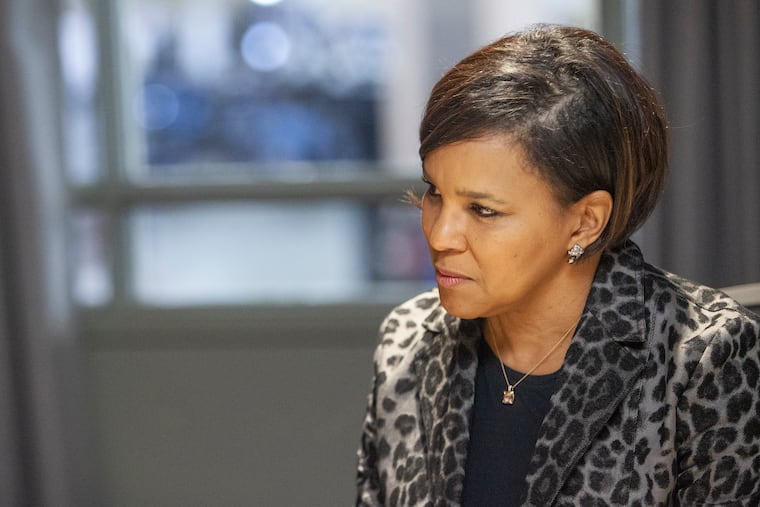Walgreens’ vaccine rollout will be led by the only Black woman to run a Fortune 500 company
Roz Brewer, stepping up to run drugstore giant Walgreens, will be the only Black female CEO of a Fortune 500 company.

Shortly after Rosalind Brewer was named CEO of Sam’s Club in 2012, she attended a small roundtable event exclusive to chief executives in New York. During the reception, Brewer introduced herself to a male CEO, who asked if she worked in marketing or merchandising — despite the invitation making it clear it was a CEO-only event.
“After I gave him the side-eye,” she recounted in a 2018 Spelman College commencement speech, pausing to reenact her expression to the graduates of the historically Black college for women in Atlanta, “I ascended to the podium as the keynote for the day, and I enjoyed the look on his face when my bio was read,” she said.
“When you’re a Black woman, you get mistaken a lot. You get mistaken as someone who could actually not have that top job.”
Brewer, who uses Roz as her first name, is not likely to be mistaken now. On Tuesday, Walgreens Boots Alliance named Brewer to lead a retail pharmacy chain that has fallen behind rival CVS and now faces the massive challenge of rolling out its stockpile of the coronavirus vaccine.
The appointment will make Brewer, who has had the chief operating job at Starbucks, the only Black female CEO of a Fortune 500 company.
It’s a singular distinction both stunning for the year 2021 and yet all too familiar in corporate America, where it has been more than four years since a Black woman held a Fortune 500 CEO job and where there are currently just four Black male CEOs.
Brewer’s resumé includes top jobs at Starbucks, Walmart, and Kimberly-Clark, and director seats on such powerhouse boards as Lockheed Martin and Amazon. This made many see her rise to the corner office as a question of when, not if.
Yet, her appointment comes at a time when American business has been grappling with its role on racial equity, spending the last year promising to diversify its ranks amid the Black Lives Matter movement. That makes Brewer, who chairs the Spelman College board of trustees and helped Starbucks navigate a high-profile racial incident in Philadelphia in 2018, uniquely position among CEOs to speak credibly about her experiences as a Black woman.
» READ MORE: Biden invites GOP lawmakers to White House virus relief talk
Brewer, 58, whose parents worked for General Motors in Detroit, has spoken openly about how the deaths of unarmed Black men George Floyd and Ahmaud Arbery have made her “nervous and scared” for all the young Black men in her life.
And she has recalled in stark terms a firestorm that erupted in 2015 on social media — Brewer has said she received death threats after she talked about demanding diversity on teams and suppliers in a CNN interview. “It was a nasty, nasty reminder that every day, people of color face systemic racism so blatant, so emboldened, and yet so normalized,” Brewer said in her Spelman commencement speech.
She faces a major challenge at Walgreens: Analysts say the pharmacy retailer has underperformed during the pandemic, struggling with lower store traffic as consumers consolidated shopping trips and bought more low-margin consumer goods. Amazon is muscling into prescription refills, and Walgreens’ biggest rival, CVS, has turned itself into an integrated health-care company after acquiring pharmacy benefits manager Caremark and the insurer Aetna.
(Walgreens first took a stake in Alliance Boots, a multinational pharmacy business, in 2012, and completed the merger in 2014. The company declined to make Brewer available for an interview.)
Meanwhile, the rollout of the vaccine presents an opportunity — analysts say it could lead to higher foot traffic and sales when consumers coming in for a vaccine stay and pick up other items. But it will also be a huge logistical challenge.
After joining Walmart in 2006, Brewer became the first woman and first Black executive to lead a major unit there when she was named chief executive of its Sam’s Club division in 2012.
Soon after joining the board of Starbucks in 2017, she was asked to lead operations at the coffee giant. Within months, she found herself managing the fallout after the arrest of two Black men waiting at a cafe at 18th and Walnut Streets in Philadelphia.
“As a Black woman, as a mother of a 23-year-old Black male myself, a girl from Detroit who challenges racism every day because she’s never had a choice, and as a human being, it infuriates me to see acts of hate, acts of entitlement, acts of privilege repeating over and over and over and over and over again in this country,” she said of the Philadelphia incident in her 2018 Spelman speech.
As the story spread wildly, Brewer picked up the story on social media early and began getting messages from her son, asking what she was going to do about it. Before long, she was flying to Philadelphia to meet with other executives to handle the crisis; Starbucks was ultimately applauded for shutting all its stores for antibias training.